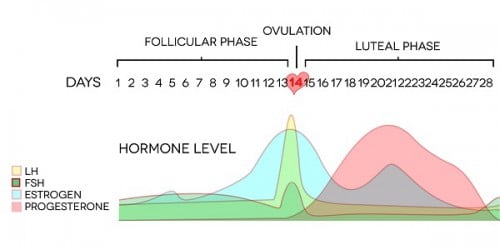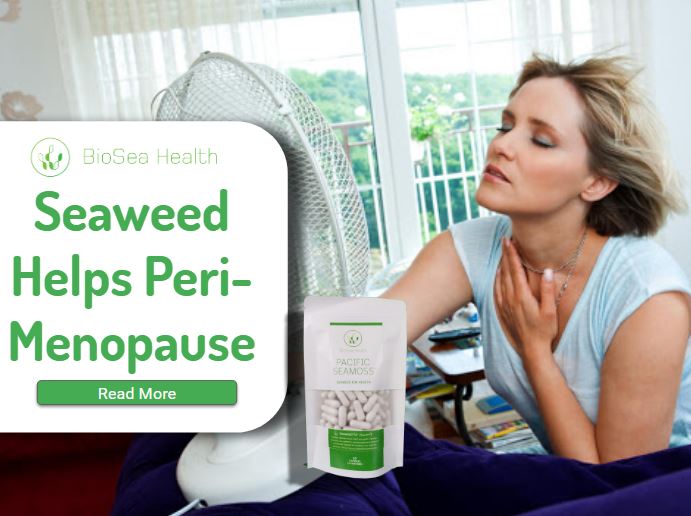A question asked by customers is does seaweed help perimenopause (menopausal transition)? Perimenopause [1] is that transition from the reproductive phase to menopause. It normally takes 2 to 6 years, but in some cases even longer. Systemic reviews [2] say the following 5 symptoms are typical:
- Mood swings
- Urinary incontinence
- Night sweats
- Trouble falling asleep
- Sexual discomfort
The Stages of Reproductive Aging Workshop (STRAW) criteria defines 4 stages of perimenopause or menopausal transition from a reproductive age through to menopause. “Premature menopause” is when the final menstrual period occurs before a woman is 40. “Early menopause” is when the final menstrual period occurs before a woman is 45. For women who experience premature or early menopause, HRT is strongly recommended until the average age of menopause (around 51 years), unless there is a particular reason for a woman not to take it.

Whats Happening?
The primary change is a change in the type of oestrogen. During the reproductive phase (from adolescent to about 50 years old) every month there is changing mix of hormones – including levels of oestrogen, progesterone, Follicle Stimulating Hormone (FSH) and Luteinizing Hormone (LH). During perimenopause, this cycle can be all over the place which is why women experience minor change to very large disruption to their life and health.

There are 3 types of oestrogen.
- In the reproductive age, the primary oestrogens is oestradiol
- Oestriol is a hormone made during pregnancy in the placentathat can be used to measure fetal health and predict when birth may happen.
- In menopause, the predominant oestrogen is called oestrone.
It is this transition of oestrodiol oestrogen to oestrone oetrogen that is the primary cause of disruption during perimenopause.
Hot Flushes and Oestrogen
Hot flushes (or flashes) are not actually temperature changes but more like an adrenaline rush – which makes you feel hot, and also makes you wide awake (hence the issue with sleeplessness). Most research suggests that hot flushes occur when decreased estrogen levels cause your body’s thermostat (hypothalamus) to become more sensitive to slight changes in body temperature. When the hypothalamus thinks your body is too warm, it starts a chain of events — a hot flush — to cool you down. For more info on hot flushes, check out the Mayo Clinic.
Hormone Replacement Therapy (HRT)
HRT, also known as hormone therapy (HT) or menopausal hormone therapy (MHT), is medication containing the hormones that a woman’s body stops producing after menopause (the oestrodial). HRT is used to treat menopausal symptoms.[7]
While HRT reduces the likelihood of some debilitating diseases such as osteoporosis, colorectal (bowel) cancer and heart disease, it may increase the chances of developing a blood clot (when given in tablet form) or breast cancer (when some types are used long-term).[7]
How Seaweed Helps Perimenopause and Menopause
There is some evidence that seaweed helps perimenopause but there has been little research focused on this. Some of the natural products include seaweed (generally kelp) and data from our Pacific Seamoss customers have commented on a large improvement. Anecdotal data is good, but what will be needed is a broader clinical trial. Remember the 5 major symptoms?
- Mood swings. About 30 to 66 percent of menopausal people will experience menopausal depression if they have experienced previous depression, postpartum depression, premenstrual syndrome or premenstrual dysphoric disorder before menopause. Ten to 20 percent of perimenopausal people will experience anxiety and/or depression for the first time. Seaweed reduced mood swings by 50% for premenstrual symptoms of women of reproductive age. Does it also reduce mood swings for older women?
- Urinary incontinence. Some customers reported improvement
- Night sweats. No feedback
- Trouble falling asleep: Most customers report better sleep
- Sexual discomfort or dyspareunia. As estrogen levels fall as women approach and pass menopause, the resulting dryness and thinning of vaginal tissues can cause penetration and intercourse to be uncomfortable for many women. The discomfort can range from a feeling of dryness to a feeling of vaginal “tightness” to severe pain during sex. This is a very private topic, and it is unlikely customers would tell us.
Seaweed Assists General Health
Seaweed has good quantities of vitamins (Vit B1, B3, B6, B12) and minerals (K, Iodine) and is an effective pre-biotic and changes gut bacteria. [6]. It may provide some relief from osteoarthritis which may start to show up in this age group.
Seaweed May Normalise Transition
The oestrogen levels can be all over the place. Back 20 years ago there was focus on soy and phyto-estrogens which help stabilisation over the transition. These days HRT treatment is used to stabilise those changes.
Seaweed may help in the perimenopause phases by normalising hormonal swings during this transition. A pilot trial showed reduction in pain and in bleeding in younger women, and reduction in PMS symptoms in peri-menopausal participants. Teas showed reduction in oestrogen in her animal studies and in breast cancer survivors.
Seaweed Is Protective against Cancers
Prof Jane Teas from 1981 [3] to 2013 [4] looked at why seaweed was protective against a range of cancers – breast and uterine, and her conclusion was that the proposed mechanisms of action are: reduction of plasma cholesterol, binding of biliary steriods, inhibition of carcinogenic fecal flora, binding of pollutants, stimulation of the immune system, and the protective effects of beta-sitosterols. So the mechanism is unclear or complicated. It may be normalisation of oestrogen by seaweed provides some protective mechanism.
Estrogen is believed to have a positive effect on the inner layer of artery wall, helping to keep blood vessels flexible. A decline in the natural hormone estrogen may be a factor in heart disease increase among post-menopausal women.[9]
Before menopause, oestrodial is protective. Once a women moves to menopause, there no longer is that protective oestrodiol and women past peri-menopause have similar lifestyle disease (heart and cancer rates) as men.
Before You Go
Facebook is preventing a number of companies that sell lubricants for women going through menopause to advertise on its service despite allowing ads for equivalent products from brands that target men. In a post in 2019, CNBC explores the world of social media. Facebook was blocking ads that target women with menopause but allowed ads from companies selling pills for erectile dysfunction. When you investigate how much money goes into one aspect of women’s health, endometriosis, US research is less than $0.60 per person. Erectile dysfunction is 19 times that research money.
References
[1] Five Solutions for Menopause Symptoms The North American Menopausal Society 2020 (Google)
[2] Taebi, M., Abdolahian, S., Ozgoli, G., Ebadi, A., & Kariman, N. (2018). Strategies to improve menopausal quality of life: A systematic review. Journal of education and health promotion, 7, 93. https://doi.org/10.4103/jehp.jehp_137_17
[3] Teas J 1981 The consumption of seaweed as a protective factor in the etiology of breast cancer. Medical Hypotheses Volume 7, Issue 5, Pages 601-613, ISSN 0306-9877, https://doi.org/10.1016/0306-9877(81)90004-9.
[4] Teas, J et al 2013 The consumption of seaweed as a protective factor in the etiology of breast cancer: proof of principle. J Appl Phycol 25 771-779 DOI:10.1007/s10811-012-9931-0 (Click for Abstract) (Click to download full paper)
[6] Wanyonyi, S; du Preez, R; Brown, L; Paul, N; Panchal, S 2017 Kappaphycus alvarezii as a Food Supplement Prevents Diet-Induced Metabolic Syndrome in Rats. Nutrients (9) 11 DOI:10.3390/nu9111261 (Click for Abstract) (Click to download full paper)
[7] Hormone replacement therapy (HRT) and menopause Victoria Health
[8] Hot flashes Patient Care & Health Information Mayo Clinic
[9] Heart disease and menopause American Heart Association
[10] Why everyone needs to know more about menopause — especially now. Washington Post 2020
Medical Disclaimer
This is not intended to be a substitute for professional medical advice and should not be relied on as health or personal advice. Always seek the guidance of your doctor or other qualified health professional with any questions you may have regarding your health or a medical condition.

